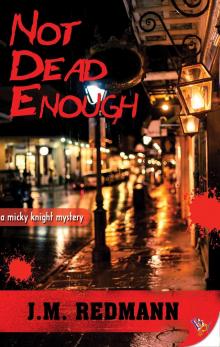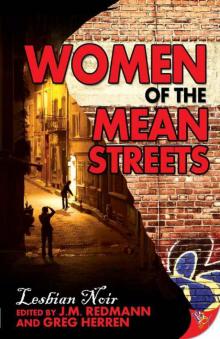- Home
- J. M. Redmann
The Girl on the Edge of Summer Page 2
The Girl on the Edge of Summer Read online
Page 2
For someone who killed herself. It wasn’t murder. Sad, a troubled teen, desperation long enough for her to take her parents’ car, drive twenty minutes, and embrace the dark water.
Maybe she had even given him the picture. Girls still do stupid things for love. Or the first glimmer of attention they mistake for love. The police don’t make arrests for crimes of the heart.
I agreed to take the case.
After she left, I wondered why I felt guilty because one more young girl had died. Or why I thought I had any business being involved. The everyday violence against women. Men kill each other for drugs or they’re drunk and stupid, or drunk and angry, or feel they have to prove something. But women die because they’re women. How many times have you skimmed the headlines, “a woman’s body was found” or “a woman’s nude body was discovered” and then a short blurb more on her death than her life.
Mrs. Susie Stevens hadn’t given me much because she didn’t have much. A lump of a boy, maybe a school mate, maybe not, had gotten a picture of her daughter, Tiffany, showing her breasts. There might have been other pictures, but that was the only one she knew about. The only one she wanted to know about.
I was to meet her tomorrow at her home in Old Metairie. She would let me have Tiffany’s cell phone and computer.
I had the feeling she wanted someone to filter her daughter’s life for her, to see the other pictures, read the naïve text messages and only pass on what a grieving mother could bear. She said all she wanted was his name and address. I doubted that. The twitching of her eyelids, the tightness of her lips said she wanted something beyond what life could give—to go back to the moment before Tiffany took the keys to the car, to grasp that one short, oh-so-short hour of time and wrench it off the path it had taken.
I took a deep breath, then another. Then prepared a case file. I wanted to jump back a few days, to the revels when my biggest concern was how to hold on to a coconut and still catch beads.
Time marches on and pain isn’t ended by a parade, only buffered, a respite of color and motion with the blare of marching bands for a soundtrack. All I could do was help Mrs. Susie Stevens through the days, find a few tattered pieces of that thing they call closure. Or maybe if Tiffany had held out a little longer, the swirling colors, the thumping drums, the bright, sparking beads in the air could have caught her and held her in this life.
My high school years, I tried not to think of them. The parades saved me on occasion. I remember clearly, all too clearly, once thinking I could just step in front of that truck and it would all end. All the misery, the despair of knowing I was so far out of place—queer, taken in by family that didn’t want me, olive skin and black curly hair, not a fair child of the suburbs, but a bastard bayou rat. It seemed there was no place in the world for me. Except at the parades, and later the gay end of the French Quarter. Looking at the truck, its gears grinding as it sped up, my foot on the curb. A step or two. But I was meeting my friends Ned and his hidden boyfriend at a parade, Thoth, uptown. I let the truck pass.
A few little threads, having someone else gay in my life, plans to meet up, had twined together, enough to keep me safely out of the road. Luck, mostly, things that would be minor were still enough to keep me holding to life. Ned, two years older, off to college after we’d doubled-dated in high school, the façade of Bryan and me and Misty and him, but once away from prying eyes, we switched. Misty was my first girlfriend, also two years older, also off to college, but she wasn’t coming back, not here, not to me.
Ned had, and said let’s meet for Thoth. That was enough; I couldn’t let him down.
Tiffany had taken that step.
It’s a case, do what you’re hired to do, I told myself. I had no magic; I couldn’t save the lost girls.
Instead, I set myself to the usual routines. First of all, check out Mrs. Susie Stevens. My gut said she was who she claimed, a suburban woman carrying a heavy sorrow, but it’s always best to fact-check instinct. Most clients are who they say they are. Not all of them are forthcoming on their reasons for why they want to hire a private detective. Guilt, shame, they don’t want to reveal everything—why their kid really left, the real reason they’re looking for someone. Best to dig behind what they say. A few clients are out-and-out cons, trying to manipulate me into doing their dirty work. Those get shown the door. With no refund on the retainer.
What Susie Smith had left out was that she only had a tenuous claim to the Mrs. The divorce papers had been filed and Mr. Smith was living in the kind of apartment ones moves into in haste, a big complex out in Metairie, built in the oil boom of past decades. He worked in insurance. Susie kept the house. A big empty house, with an older son in college at LSU and her only other child dead.
She did volunteer work for a local hospital, was active in a gardening club, winning a prize for her roses. It seemed her husband’s paycheck had been the one that bought the nice house in Metairie, paid the college tuition, and kept the family firmly in the upper middle class. I wondered how long Susie would be able to hold on to the house. She put a brittle façade on her crumbling life and didn’t want me to know. She didn’t deliberately lie; the truth was too acid to tell. Her life was spinning out of control—her son’s leaving was the only expected and accepted loss. Children grow up. But her second child would never grow up, never leave for college, always be a brutally torn scar of blame, regret, and loss. Her husband? Ex-husband? Maybe their marriage was strong until this ripped it apart. Or maybe it was already crumbling and this was the end of the end.
Susie Stevens didn’t need to spend time and money searching for the lout who’d posted her daughter’s half-nude picture. She needed to get into therapy, move out of a now haunted house, and find a way to live the decades she still had of her life.
I considered calling her to say I couldn’t take the case. But the rationalizations came back. She would find someone to do it. It was better she find someone like me.
Plus, I had to admit, I wanted to find the asshole. Nothing illegal, but he needed to sweat, and sweat long and hard. Maybe that was the other reason I shouldn’t take this case. But I didn’t think about that. Even I wouldn’t believe my rationalizations.
CHAPTER TWO
Brandon ignored her the first time she called his name. And the second.
It wasn’t until she was standing in his bedroom door, shaking something at him, that he looked up at her. This was the first time he’d gotten to level four, and he didn’t want to be interrupted.
“Can’t you ever take care of your things? I found these behind the dryer; they’ve been stuffed there for God knows how long. These are the new jeans your grandmom brought you for Christmas.”
“Sorry, I forgot,” he mumbled, not looking at her.
“How could you forget? They stink!”
“Sorry,” he mumbled again. “They musta got dirty behind the machine.”
“This isn’t dirt, this is dog s—poop. Weeks-old, hardened dog poop.”
He almost laughed at her clumsy switch from saying “shit”—like he didn’t know the word. Poop. “Poop” was a funny word. But laughing would only keep her tirade going.
“Sorry, Mom,” he tried again. “I didn’t realize I must have stepped in it. And then forgot.”
“How do you forget a mess like this? Can you look at me?”
He paused the game first, then looked at her. Just long enough to meet her demand.
“Sorry, I forgot,” he repeated, his hand still on the gaming control. “I won’t do it again.” There, that should be enough, it usually was. His hand moved to un-pause his game.
“Maybe you won’t do it again if you have to clean them.” She threw the jeans at him, landing on top of his laptop.
His hand jerked away from the foul smear. To get it off his computer, he had to carefully wad the jeans up to keep the dog shit in the middle. Just in time to hear the bloop-bloop-bloop of doom. Back to level five.
He hadn’t expected his mother to do tha
t. When he said he was sorry, that was usually enough to get her to let go of whatever she was nagging him about. Even if he didn’t mean it. That was their bargain. He obeyed the rules—sort of, saying sorry when it seemed like that was what she wanted. Getting Bs, sometimes even As in things he liked, like biology. And she didn’t harass him too much.
She’s probably on the rag, he thought, repeating in his head one of the lines Kevin used when girls were stuck up. But he quickly banished the phrase; he didn’t want to think about his mother and down there. That was too heretical, even for him.
He hadn’t forgotten about the jeans, more ignored them day after day because he didn’t want to think about them, about peeling the wet and stinking jeans off, hoping his mother wouldn’t notice how late he’d come home, wouldn’t ask questions he couldn’t answer.
He found a plastic grocery bag, one he used to sneak forbidden snacks into his room, and put the wadded-up jeans into it, tightly tying the handles together. Maybe it would keep it from smelling up his room.
Then he went back to playing his computer game.
CHAPTER THREE
The weather held, bright and cheery, too nice by far for the errand I was on, going to Mrs. Susie Stevens’ posh house in the suburbs to paw through her dead daughter’s things.
I had to look up her location on the map—the one on my so-called smartphone. It wasn’t smart enough to tell me not to take this case—or what to do about my love life, and that was the kind of smart that would have been truly useful, although speaking an address and having it tell you how to get there was kind of helpful. I know New Orleans proper, but for the suburbs I have something I call dyslexia of the chain stores. It all looks alike, so I’m never quite sure of where I am. Or if I should be there at all.
Mrs. Susie Stevens lived in a house off Metairie Road, the kind of street parents called a good place to raise kids, not knowing how wrong they could be. The houses here were originally built in the prosperity of the ’50s and ’60s. Most, like many of the women living in them, showed signs of having had work done to keep them attractive looking. Mrs. Stevens’ house now took up most of the lot, the façade updated to matching red brick, with faux Georgian columns, a lawn clipped like a drill sergeant’s head, tasteful landscaping on the borders, ordered like the sergeant’s troops in neat rows and lines. No wonder Mrs. Stevens was so shattered; this house was one of order, a bulwark against the twists and turns and blind alleys life could take you on.
I sat in my car, ambivalent about pursuing this. Again, I ignored my instincts and let facts—the ones I was aware of—guide me. She would find someone else, and that someone else could be venal. Being involved gave me some control; walking away gave me none. And maybe that was it, no matter what my instincts told me; I couldn’t just walk away.
I got out, striding up the perfectly weed-free walk, and rang the doorbell.
She answered as if she had been hovering at the door waiting. For anything to intrude into her shroud of grief. She managed a weak smile, but it didn’t reach her eyes, the reflex action of a woman named Susie, not Susan, always polite.
The wan smile was the only greeting she managed. “Please come this way,” she said as I entered her house.
It felt too empty, not a dog or cat or even parakeet to keep her company. As with the yard, it was as neat and clean as a house about to be shown by an owner desperate for a sale. Even the strong morning sun didn’t reveal a mote of dust. I gave her the benefit of a doubt that this was grief, obsessively cleaning as if it could restore order to her life, that once there had been a family and people running messily through this house, leaving the usual trail of footprints, glasses left on tables, books half-read on a couch.
With no other words, she led me down a long hallway, with a large den running the length of one side and on the other first what was clearly a boy’s room with football memorabilia and sports car pictures, then a bathroom, also too clean to have been used recently, and finally, a smaller room than her brother’s, a room just as clearly a girl’s, with pictures of boy bands—I had no idea who they were, except to be able to tell they were either in showbiz or gay. Or both. Her bedspread was pink, with white curtains dotted with pictures of pink roses that matched the bed. Clearly this orderly household allowed for no gender nonconformity.
You don’t know that, I reminded myself. Maybe Tiffany and her brother were happy in their traditional choices. Cordelia used to say you’re not really open minded if you don’t accept people making choices you would never make. Like a pink bedroom. It didn’t matter what Cordelia used to say, even if she was right. Cordelia was my…ex? Was that all that was left?
“Let me know if you need anything,” Mrs. Stevens said at the door.
“What should I be looking for?” I stepped into the room.
She didn’t follow; this room had too much grief. I turned back to her and the door, standing close enough that she could see only me and not the room. But she didn’t look at me, only down at her clean floor.
“Whatever will help you…find justice,” she said softly.
I won’t find justice here, I wanted to say. Pure, shining justice was only available on TV or books or in the stories we tell ourselves. Real life was muddy and messy, with everyone telling their version of the truth so that nothing like one truth existed anymore. I might find a few facts, complicated bits of information that could fit into a truth she could live with. Maybe one she could call justice.
“I’ll do what I can,” I offered. “Do you know what her passwords were?”
She pointed to a small pink notepad. “They’re supposed to be listed in there. We didn’t let her have any accounts we couldn’t monitor.”
I doubted that. She wasn’t likely to be sending racy pictures where her parents could see. “Supposed to” was as close as her mother was likely to admit to her daughter having had a life her parents didn’t know about.
She repeated, “Let me know if you need anything,” and without waiting for a reply, went back down the long hallway.
The computer and her phone would probably tell me more than anything else, but I paused to look around the room. Unlike the rest of the house, this room felt like someone lived here. School books piled on the desk, a note with a phone number jotted on it stuck under a clock. The obsessive cleanliness had stopped at this door. Mrs. Stevens, and presumably her husband, couldn’t bear to erase the faint traces of their daughter, couldn’t straighten the books on her desk, wash the pants hung over a chair in the corner, make the bed more neatly than the hurried pulling-up of the covers.
Interspersed with pictures of the boy bands were ones of her with her friends, attesting to the ever-present cameras we now lived our lives with, groups shots of her with several friends, the same shot, first serious, then less serious, then goofy and acting up. She had a wide smile, the perfect teeth of the middle class, shoulder-length brown hair, hazel eyes that even when she was smiling never seemed content and comfortable. Just the angst of adolescence? Or was she unsure of herself, hovering at the dreaded edge of acceptance and rejection by her peers? I looked again at the picture, searching for a clue to who she was, but it remained resolutely just a fraction of a second of her life, one safe enough to put on the walls of her room. There were additional pictures of a family trip to the beach, again, multiple shots, a happy family posed before emerald-blue waters, probably of the Florida coast around Pensacola. This time they were all smiling.
I turned away from their smiles.
I rarely looked at the few photos from that time in my life. Maybe I had been smiling as well, hiding the pain, the fear. A split second of posing for the camera. My room had been radically different from Tiffany’s, a thrown-together room in the garage of Aunt Greta’s and Uncle Claude’s home, barely enough room to stand up in even at the peak of the roof. Not a place I could invite friends to come hang out. But it was filled with books. I couldn’t afford to buy many, but a constant stream from the library, both at school and the
local one. Books—and parades—had saved me.
I took out my phone and took pictures of the pictures, of the room, of the pink bedspread. In a few weeks they would most likely just be more photos to delete, but it was easy to take a picture now in case it would ever come in handy.
I heard a vacuum cleaner start, as if this house needed to be even cleaner than it already was.
I sat at her desk, in a chair painted pink to match the pink roses and the bedspread, and opened the pink notebook. There were pages of various accounts and passwords, written in a neat, flowery script, with smiley faces over the Is. Computer geek I am not, but I can muddle through the basics. I checked the phone first.
I’m too old for this was my thought after attempting to translate text messages like “c u b4 shc,” “r u go 2 wk.” Maybe I was misreading, but most seemed to be about where to meet people and other exciting stuff like that. I scanned through the photos, but nothing that indicated where the half-naked picture had come from or been sent to. I put the phone down and opened up the computer. A quick glance at her browsing history told me she had other accounts than the ones listed in her pink notebook. I checked in the back of it, just in case she’d written them there. Several pages had been ripped out, leaving little tags of paper on the spiral wire. A quick look in her trash can told me she had been smart enough not to leave them there. Or she’d jotted down some note—schoolwork, a phone number—she wanted to take with her. I’d have to farm her laptop out if I wanted to gain access to those files—and make sure I warned the computer grannies of what they might find.
Since I was there and the vacuum was still going, I did a search of her room. Maybe the sheets with the secret passwords were hidden taped under her sock drawer.
I found a hoard of chocolate bars under her bras. Binge eater? Or just liked chocolate and wanted a stash her brother couldn’t scarf down? I dumped them into my bag. Mrs. Stevens hadn’t said it, but it seemed part of our bargain was for me be the one to forage through her daughter’s life and filter what I passed on to her. Not deliberately hide, but unless the chocolate bars turned out to be important, she didn’t need to worry her daughter had an eating disorder on so little evidence. Besides, it might be years before this room would be cleaned out. Stale, moldy chocolate wouldn’t be a pleasant discovery.

 Not Dead Enough
Not Dead Enough Ill Will
Ill Will The Shoal of Time
The Shoal of Time The Girl on the Edge of Summer
The Girl on the Edge of Summer Women of the Mean Streets
Women of the Mean Streets J.M. Redmann - Micky Knight Mystery 7 - I'll Will
J.M. Redmann - Micky Knight Mystery 7 - I'll Will